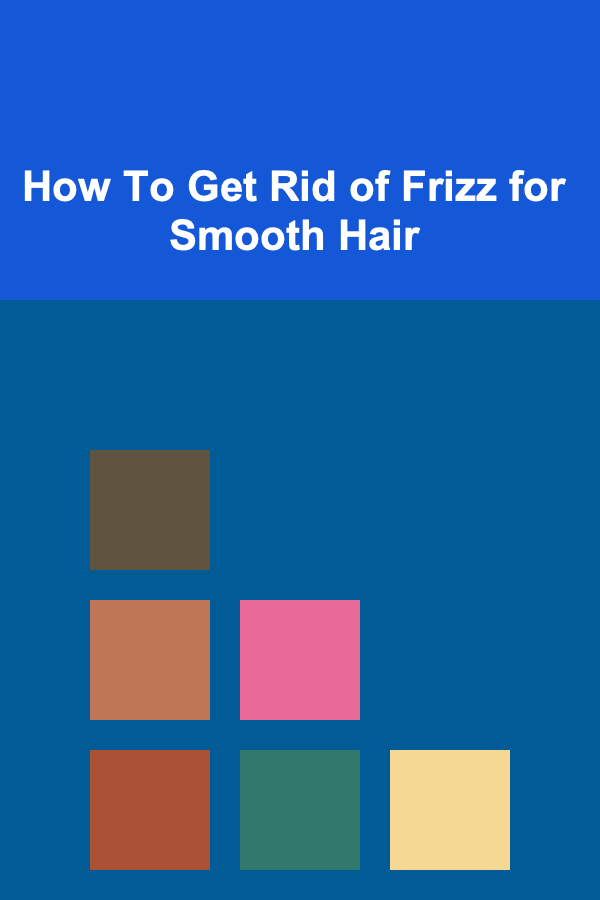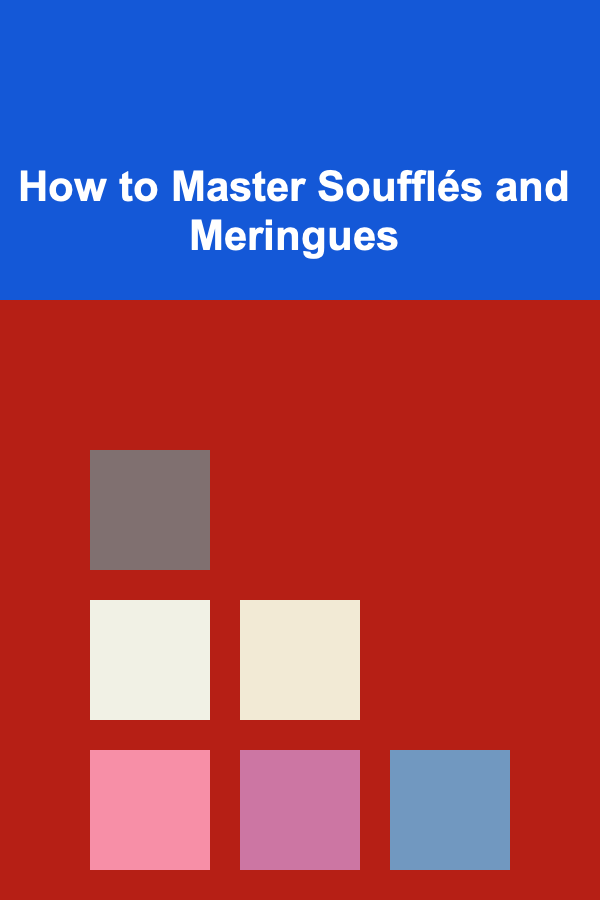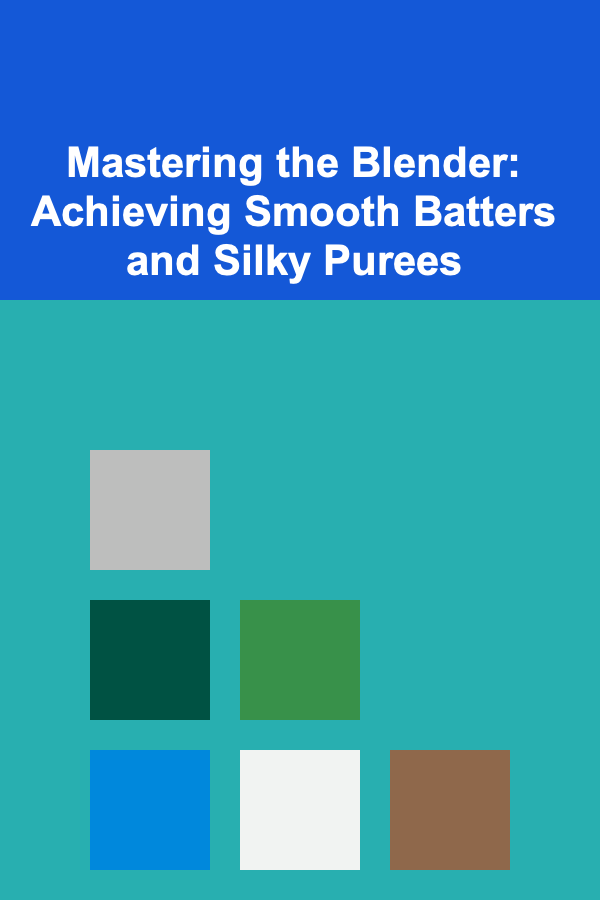
How To Get Rid of Frizz for Smooth Hair
ebook include PDF & Audio bundle (Micro Guide)
$12.99$8.99
Limited Time Offer! Order within the next:

Frizzy hair is one of the most common hair complaints worldwide, affecting individuals with all hair types, textures, and lengths. Whether you have straight, curly, or wavy hair, dealing with frizz can be frustrating. Frizzy hair occurs when the hair's cuticle (the outer layer of the hair shaft) becomes raised, allowing moisture from the air to enter the hair and cause it to swell. This leads to the hair appearing dry, puffy, and unmanageable. But don't worry! With the right care, products, and techniques, you can reduce frizz and achieve smooth, sleek hair.
This article will delve deep into the causes of frizzy hair, various methods to reduce frizz, and essential tips for maintaining healthy, smooth hair. By following the steps outlined below, you can confidently transform your frizzy hair into smooth, shiny strands.
Understanding the Causes of Frizz
Before we can address how to get rid of frizz, it's important to understand why hair becomes frizzy in the first place. The root causes of frizzy hair are multi-faceted and can vary based on a number of factors, including genetics, humidity, hair texture, and hair care practices. Here are some key reasons why hair becomes frizzy:
1. Dryness and Dehydration
One of the most common causes of frizzy hair is dryness. When your hair is dehydrated, the cuticle lifts, allowing moisture from the air to penetrate the hair shaft. This causes hair to swell, leading to frizz. Dry hair can be caused by a lack of moisture in the hair, which can happen due to over-washing, using harsh hair products, or environmental factors like sun exposure and pollution.
2. Humidity
Humidity plays a significant role in hair frizz. When the air is humid, the moisture in the atmosphere interacts with your hair, especially if your hair is dry or damaged. This leads to the hair cuticle absorbing moisture and swelling, which is what causes the frizz. This is especially prevalent in curly and wavy hair, as the natural texture of the hair exacerbates this effect.
3. Chemical Damage
Frequent use of hair dye, bleach, perms, or straightening treatments can cause hair to become porous and fragile. When the cuticle is compromised, it struggles to retain moisture, leading to frizz. Over time, chemical treatments can weaken the hair's natural structure, making it more susceptible to environmental factors like humidity.
4. Heat Damage
Excessive use of heat styling tools like flat irons, curling irons, and blow dryers can cause damage to the hair cuticle. Heat can strip hair of its natural moisture, making it more prone to frizz. Moreover, heat styling often causes split ends and breakage, which makes hair look uneven and frizzy.
5. Genetics
Your genetic makeup plays a significant role in the texture and appearance of your hair. Some people naturally have curly, coarse, or textured hair that is more prone to frizz. Curly hair, in particular, tends to be drier and more frizzy because the natural oils from the scalp have a harder time traveling down the twists and turns of each hair strand.
6. Environmental Factors
Pollution, wind, and sun exposure can strip hair of moisture, making it dry and frizzy. Additionally, cold weather can make the hair's cuticle contract, leading to more frizz. On the other hand, exposure to high temperatures can weaken the hair shaft, leading to frizz and dullness.
How To Get Rid of Frizz: Proven Tips and Techniques
Now that we understand the causes of frizz, let's explore the various techniques and products that can help you get rid of frizz and maintain smooth hair.
1. Hydrate and Moisturize Your Hair
The most crucial step in eliminating frizz is ensuring that your hair stays moisturized. Well-moisturized hair is less likely to absorb moisture from the air and swell, which is the primary cause of frizz. Here's how you can keep your hair hydrated:
- Deep Conditioning Treatments: Use a deep conditioning treatment once a week to restore moisture to your hair. Look for products that contain natural oils (like argan oil, coconut oil, or olive oil) or proteins that can nourish the hair and prevent dryness.
- Leave-In Conditioners: Apply leave-in conditioners or moisturizers to damp hair to lock in moisture. These products provide long-lasting hydration and make hair more manageable, which helps reduce frizz.
- Moisturizing Shampoo and Conditioner: Switch to shampoos and conditioners that are specifically formulated for frizzy hair. These products are designed to help seal the hair cuticle, providing long-lasting hydration.
2. Avoid Over-Washing Your Hair
Over-washing can strip your hair of its natural oils, which are essential for keeping your hair moisturized and frizz-free. If you wash your hair too frequently, it may become dry, brittle, and more prone to frizz. Instead, aim to wash your hair every two to three days or as needed based on your hair type and lifestyle.
When you do wash your hair, opt for sulfate-free shampoos. Sulfates are harsh detergents found in many shampoos that can strip the hair of natural oils, leading to dryness and frizz.
3. Use a Microfiber Towel or Cotton T-Shirt
When drying your hair after a shower, avoid rubbing your hair with a regular towel, as this can cause friction and frizz. Instead, gently blot your hair with a microfiber towel or an old cotton t-shirt. These fabrics are gentler on the hair and help to absorb moisture without roughing up the cuticle.
4. Limit Heat Styling and Use Heat Protection
Excessive use of heat styling tools can cause severe damage to your hair. If you must use heat tools, make sure to apply a heat protectant spray or serum before styling. This creates a barrier between your hair and the heat, preventing moisture loss and minimizing frizz.
Whenever possible, embrace air-drying your hair, or opt for heatless styling methods, like braiding your hair before bed to create natural waves.
5. Choose the Right Hair Brushes and Combs
The type of brush or comb you use on your hair can greatly affect frizz levels. Avoid using plastic or metal brushes, as they can create static and cause frizz. Instead, opt for a wide-tooth comb or a brush with natural bristles, which are gentler on the hair.
When combing or brushing your hair, always start from the ends and work your way up to avoid breakage and tangling.
6. Opt for Anti-Frizz Hair Serums or Oils
Anti-frizz serums and oils are great products to smooth down frizzy hair. These products work by coating the hair and creating a barrier that locks in moisture and prevents frizz. Look for products that contain nourishing oils, such as argan oil, jojoba oil, or coconut oil, which help to smooth the hair and add shine.
Apply a small amount of anti-frizz serum or oil to damp hair, focusing on the ends and mid-lengths. Avoid applying too much product to the roots, as this can make your hair look greasy.
7. Protect Your Hair While Sleeping
While you sleep, your hair can become tangled and frizzy from friction with your pillowcase. To prevent this, switch to a silk or satin pillowcase, as these materials create less friction than cotton. Alternatively, you can wrap your hair in a silk or satin scarf or bonnet to reduce frizz and protect your hair while you sleep.
8. Get Regular Trims
Split ends and damaged hair are more prone to frizz. To keep your hair healthy and frizz-free, make sure to get regular trims every 6--8 weeks. Trimming your hair prevents the ends from becoming dry and brittle, reducing the likelihood of frizz and breakage.
9. Avoid Tight Hairstyles
Tight hairstyles, such as ponytails or braids, can cause tension on your hair, leading to breakage and frizz. When styling your hair, opt for loose, gentle hairstyles that don't cause strain on the hair shaft.
Natural Remedies for Frizzy Hair
If you prefer natural remedies to combat frizz, there are several DIY treatments you can try at home. These ingredients can help moisturize and smooth the hair without relying on harsh chemicals.
1. Coconut Oil
Coconut oil is a highly effective natural moisturizer. Its fatty acids help to penetrate the hair shaft, providing deep hydration and reducing frizz. Simply warm up a small amount of coconut oil between your palms and apply it to damp hair, focusing on the ends. Leave it in for 30 minutes before rinsing out.
2. Apple Cider Vinegar Rinse
Apple cider vinegar (ACV) is a great natural treatment for frizzy hair. ACV helps balance the scalp's pH, smooth the hair cuticle, and add shine. To make an ACV rinse, mix one part apple cider vinegar with two parts water and pour it over your hair after shampooing. Leave it in for a few minutes and rinse with cool water.
3. Aloe Vera
Aloe vera is another natural ingredient that helps hydrate and smooth the hair. It contains enzymes that promote healthy hair growth and reduce frizz. Apply fresh aloe vera gel directly to your hair and leave it in for 20--30 minutes before rinsing.
Conclusion
Frizzy hair can be a nuisance, but with the right approach, you can significantly reduce frizz and enjoy smooth, shiny hair. By understanding the causes of frizz, adopting the right hair care practices, using the best products, and protecting your hair from damage, you can achieve a frizz-free mane. Remember that everyone's hair is different, so it may take time and experimentation to find what works best for you. Be patient and consistent, and soon enough, you'll be able to flaunt smooth, healthy hair with confidence.

How to Make Money Online as a Compliance Officer: 10 Actionable Ideas
Read More
How to Set Up a Pet-Friendly Kitchen
Read More
How to Master Soufflés and Meringues
Read More
How To Handle Audience Participation Smoothly
Read More
Mastering the Blender: Achieving Smooth Batters and Silky Purees
Read More
Hiking Across Different Terrains: Desert, Forest, and Mountain
Read MoreOther Products

How to Make Money Online as a Compliance Officer: 10 Actionable Ideas
Read More
How to Set Up a Pet-Friendly Kitchen
Read More
How to Master Soufflés and Meringues
Read More
How To Handle Audience Participation Smoothly
Read More
Mastering the Blender: Achieving Smooth Batters and Silky Purees
Read More